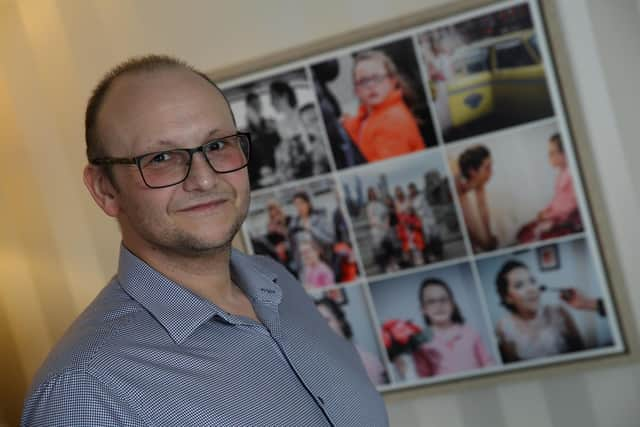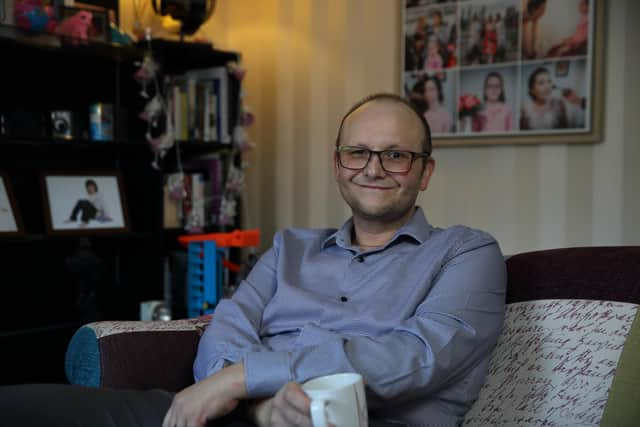Preston stroke victim, 51, missed out on 'miracle' treatment because it was the weekend
and live on Freeview channel 276
Then suddenly he began to lose his speech and sight from from his left eye.
“I’d lost the ability to talk, so I couldn’t shout out for help. When I was at home, my girls were giggling as water was coming out of the left side of my mouth – they thought I was just messing around,’ he explained.
Advertisement
Hide AdAdvertisement
Hide AdAt the hospital, doctors discovered Phil had had a TIA or mini stroke and went on to have a major stroke caused by a blood clot while in hospital.


Scans soon revealed that Phil was a candidate for a thrombectomy but was then told that the procedure was only available Monday to Friday, not on the weekend.
Phil would go on to spend four months in hospital and two months in a wheel chair after discharge as he lost the use of his left side.
The dad had to have months of intensive physiotherapy, which he then had to carry on independently. He had to learn to walk and talk properly again and still has many
struggles both physically and mentally since the stroke.


Advertisement
Hide AdAdvertisement
Hide AdPhil said he was disappointed that despite qualifying for a thrombectomy, which could have changed his life in minutes, there was no service available to do the treatment.
“I was selfish and had my stroke at the weekend, ‘ he said.’ I was angry that I had had my hopes dashed and the treatment was only available during the week, 9 -5. The staff were all good people but they had only been asked to provide the service during those days and times.’
“It was a question of money and resources. There’s no way of telling that I would have had a better outcome with the thrombectomy but statistics show you that yes I would have had a better quality of life with it and so would those around me.”
Phil is now working with the Stroke Association and with the local Integrated Stroke Delivery Network to raise awareness of the lived experience of stroke and to make sure thrombectomy and other life changing treatments are more widely available.
Advertisement
Hide AdAdvertisement
Hide Ad“Improving stroke care and access to the best treatments won’t benefit me now but will benefit the people of tomorrow – it’s to the wider society. I chair a patients and carers group to make sure that stroke survivors and those close to them get their voices heard,’ said Phil.
“I want to make sure that things like thrombectomy are always on the agenda. This isn’t a service needs that needs trialing– it’s well proven, it’s well researched and evidenced.”
Jennifer Gardner, Associative Director for the North West at the Stroke Association, has seen some improvements in the region but knows there is more to be done:
“Thrombectomy is a miracle treatment that pulls patients back from near-death and alleviates the worst effects of stroke. It’s shocking that so many patients are missing out and being saddled with unnecessary disability. There are hard-working clinicians across the stroke pathway facing an uphill struggle to provide this treatment and it’s time they got the support they need to make this happen. It really is simple. Thrombectomy saves brains, saves money and changes lives.
Advertisement
Hide AdAdvertisement
Hide Ad“Since the time we commissioned the report there have been some steady signs of improvement in accessing thrombectomy in the North West. There is a real commitment and a phased plan in place in Lancashire and South Cumbria to establish a 24/7 service. It’s also promising to see the improvements being made to existing stroke units and the funding that is being allocated too.
“However, there is still an unacceptable postcode lottery of stroke treatment, at a time when tackling health inequalities is a key priority for the government and NHS. Rates are rising gradually due to sustained efforts from national and local stroke teams, but progress is far slower than it needs to be. Tens of thousands will miss out, if rates stay
the same as in 2020/21."
THE CAMPAIGN
The Stroke Association is arguing that NHS England must address challenges in transferring patients to and between hospitals in its upcoming Urgent Emergency Care Plan.
The procedure can be performed up to 24 hours of symptoms starting, but it is most effective within the first six hours. The sooner it is carried out the better results can be, which means that making sure ambulances are available to take patients to hospital and between hospitals is vital to a good recovery.
Advertisement
Hide AdAdvertisement
Hide AdRecent wait times for the North West ambulance service were an average of 39 minutes, well above the 18 minute target for stroke calls.
The Stroke Association says:
- For every 10 minutes of delay, the procedure has a 1% reduction in chance of patient benefit
- For every minute a stroke goes untreated, 1.9 million brain cells die
- More than one in eight (13.2%) of strokes are fatal
- Two-thirds of stroke survivors leave hospital with a disability
Advertisement
Hide AdAdvertisement
Hide AdThe Stroke Association also calls for [area/s] to act on their Thrombectomy Quality Review[s] to solve pathway issues holding back improving their thrombectomy rate, saying
- There are over 75,000 strokes in England every year.
- Approx. one in 10 (10%) of all stroke patients – stroke where the clot is trapped in a larger blood vessel - would benefit from a thrombectomy
- Almost four in 10 (39%) thrombectomy patients experience reduced disability as a result of the procedure.